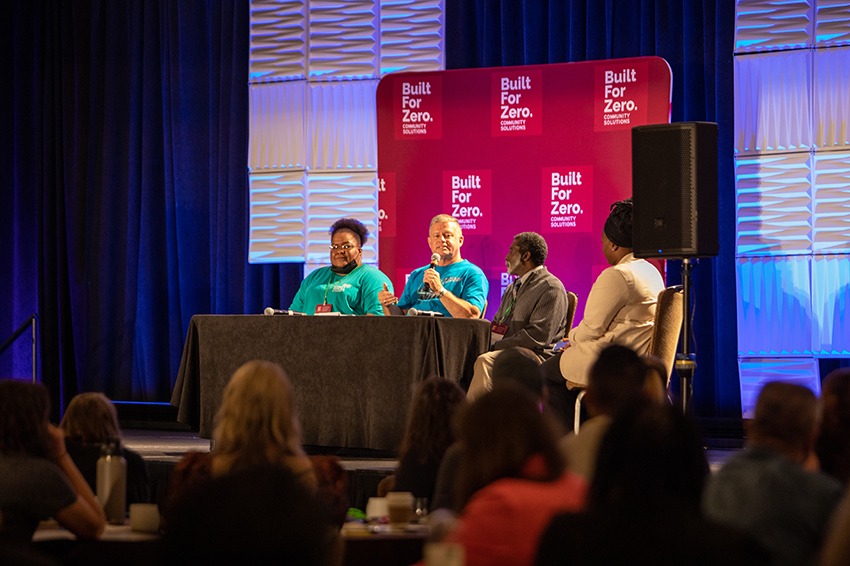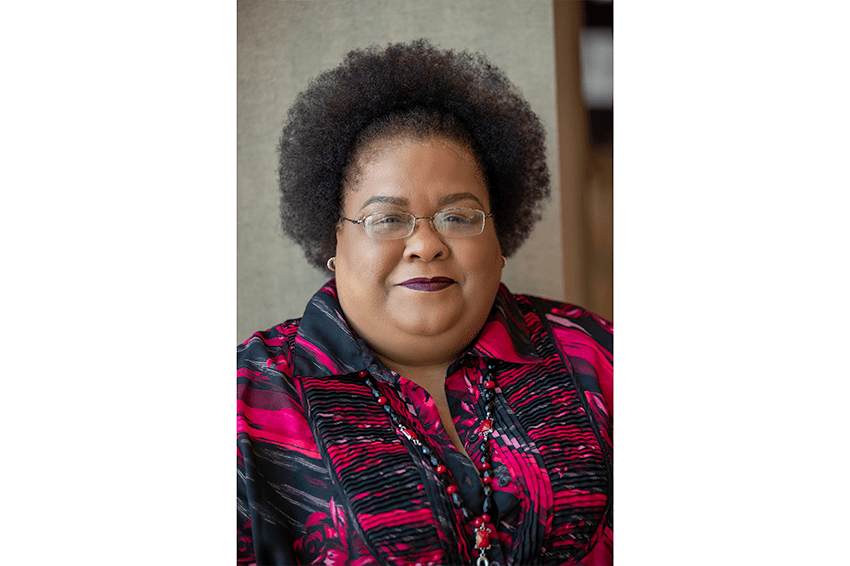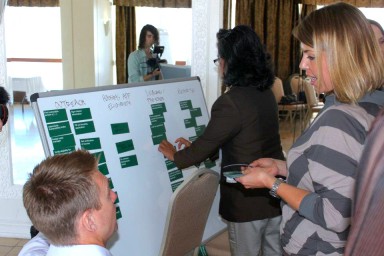Tyra Thomas knows firsthand what she describes as “the wear and tear on the soul and spirit and the body” caused by structural barriers and homelessness.
Thomas is a Housing Equity Strategist at Community Solutions, where she works to address inequities in housing among minorities, veterans, and other underresourced groups. Born and raised in South Minneapolis, Thomas is a leader at Street Voices of Change, a group of individuals with current or past experiences with homelessness who advocate for systems change.
In the four years since the murder of George Floyd in her hometown, Thomas has seen an encampment grow blocks from where he was killed. She notes that some living in the camp knew Floyd. She herself met Floyd when he was working at a homeless shelter — a shelter that Thomas went to looking for help when she lost housing.
Now she’s working to help others out of homelessness.
Recently, the nation received the Johnson v. Grants Pass Supreme Court decision. The highest court in the U.S. has determined that it is not cruel and unusual punishment to ticket or arrest homeless people for sleeping on the street. At this moment especially, we must listen to the voices of those who have experienced homelessness.
“How are people going to help folks who have been traumatized?” Thomas asks. “And quit blaming, quit criminalizing, and quit shaming folks who are living in poverty?”
Community Solutions got the chance to speak to Thomas about her work in the fight to solve homelessness. Editor’s note: this conversation took place before the Supreme Court ruling in Johnson v. Grants Pass.
Can you tell me about your work as a Housing Equity Strategist for Community Solutions?
I’m someone who has experienced homelessness on and off with children and without children. For most of those times, no one told me there was a shelter I could go to. And my family didn’t know there were shelters available to house people.
And so with that experience, I thought to myself, imagine all of the folks, especially those who end up in encampments, who don’t know that shelters are available, or who come to realize through word on the street that that shelter wasn’t treating people well. And so they don’t go.
Here in Minnesota, we have dealt with redlining and house deeds with so much harmful verbiage, where they could not sell their home to someone else of color. For me, being a Housing Strategist is about dealing with injustice.
But it’s also about housing choice. Do you want to buy a home? Do you want to rent? What neighborhood do you want to live in? And that’s how I got involved in being a Housing Strategist. I want to know: how do we make it equitable for everyone, including the skin I’m in?
“I want to know: how do we make it equitable for everyone, including the skin I’m in?”
What do you wish people understood about homelessness?
A lot of folks would like to say, ‘oh, well, if they just quit using drugs, if they just quit drinking, if they just quit doing this, they can have their housing.’ I have come to know so many people in the homeless community, where the traumatization of not having housing actually fueled an addiction that was solvable.
Powderhorn Park is where an encampment came to be. I went there on my own. I grew up in that park. When I got there, I saw people who I went to school with, people who were my neighbors. I saw a community trying to find out the best way to care for people in the midst of their addiction when I worked in the medical tent.
I realized how to love people where they’re at and not where I think they should be.

What made you want to get involved in working with Community Solutions?
They were willing to bring lived experience to the table, which is so important. I have 18 congregations I work with through Align Minneapolis that support ending homelessness. However, they even had to learn as a faith-based organization that we can’t keep having these conversations with lived experiences not at the table. So that was key.
The other thing that drew me in is that someone I consider my colleague and beloved friend, Amber [Chandler], that she spent time getting to know me. She got time to learn my story. That was really important, because it’s all about trust.
What were some circumstances when you experienced homelessness?
I remember experiencing homelessness during the crack epidemic [around 1997] when I was with children. And yet, I was in a property where that was happening.
They banished the landlord and kicked everybody out of the building. It was a building with eight units. Every unit in that building had been raided by the health department. The inspector said to me that mine was the only one that didn’t have drug paraphernalia in it. But she never once said to me, “how can I help you get out of here?”
They shut that building down. And it was one of the last apartments that was affordable at that time. So I went to stay with my sister. Nobody told me there was a family shelter nearby.
“As far as fines or arrests, I have attempted to help so many people get housing who are blocked. The fines are a barrier, arrest is a barrier, an open case is a barrier.”
Did you encounter criminalization tactics while experiencing homelessness?
The undercover criminalization of homelessness is called the eviction process. You feel like a criminal. You get an eviction and it’s on your record. And it follows you for years and years, and you’re trying to get to the next place.
My trouble has already been around my past rental history. They don’t know if I paid it or didn’t pay. They see that in my record and say, “no, we can’t rent to you.” So in that respect, that makes me feel criminal.
As far as fines or arrests, I have attempted to help so many people get housing [through Street Voices of Change] who are blocked. The fines are a barrier, arrest is a barrier, an open case is a barrier. A landlord might say, “well, if you got this going on, how are you also going to pay me or will the authorities warrant you and break down the door?”
What do you wish people understood about efforts to criminalize homelessness?
In Minneapolis, the grassroot level and The Office to End Homelessness is working really hard to get people housed. And they’ve done a fantastic job with the Street to Housing Team managed by David Hewitt, Director of the Office to End Homelessness for Hennepin County. Yet, in the meantime, folks are getting ticketed. The mentality is like “nobody will see us messing with you.” And that’s what’s so powerful about [Gloria] Johnson standing up for herself.
Why do you think homelessness is solvable?
To say it’s not solvable is a lie. As a transit rider, I view a lot of buildings that are empty. Sometimes they are brand new. You’re telling me there’s not enough housing, but I’m looking at vacant lots, vacant properties, even historical properties.
If there was enough grace to support folks who have certain conditions, who have nowhere to be, we wouldn’t be talking about encampments, we wouldn’t be talking about folks sleeping on the street. But the reality is they don’t have enough beds here in Minnesota.
If everyone decided ‘you know what, I’m just going to go to the treatment center. I’m just gonna go to the shelter. I’m gonna go into this housing program you’re talking about,’ they don’t have enough beds [for everyone].
They’re not just getting pushed around from block to block. They’re getting pushed from state to state. And this is something that I’ve always known, and that’s why I became a Housing Equity Strategist with Community Solutions on a national level.
Homelessness is solvable. And the key to that is safe, deeply affordable, equitable housing, such as a duplex, apartment, flat, townhouse, house, or even a tiny home in the neighborhood of your choice.





